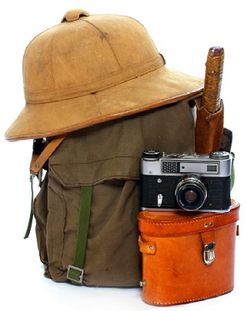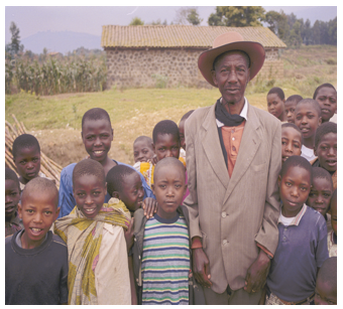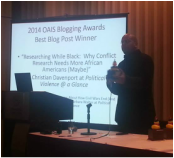
Karinne (as usual not her real name) appeared to be into everything. She was in three educational programs in five different countries. She was co-Director of two centers. She was writing several articles for journals and generals alike on women, democracy, civil society, new media, public spheres, genocide, women and genocide, democracy and women, civil society and genocide, truth and reconciliation, reconciliation and genocide – you get the point. Unfortunately for Karinne, she did all this poorly. Stretched too thin, all efforts seemed to be half-hearted.
Now, this is not to say that Karinne was incapable of learning or alternatively teaching. Rather, she had no interest in learning how to do anything correctly because that would just slow her down and cut into her profit margin. All Karinne had to do was a little of everything regardless of quality because in Rwanda at the time there was a lot of nothing - not nothing nothing for there were a great number of initiatives underway; just nothing completed or completely working. In addition to this, there was a lot of people, sympathy as well as money coming to the country in order to help get something, anything started. And it came from all corners of the globe, it came – almost daily via envelopes, packages, Western Union, UPS, Fedex, Horses and Buggies.
The desire to send was clear. Individuals felt guilty about not doing anything. Collectively we had failed to do anything about the violence. We could not sit back and not do anything about the aftermath. Individuals also wanted to be part of the redevelopment. But where should their support go - I mean where exactly do you send the check? Rwanda was still a mystery to most of the world. They knew killing fields but nothing about survivors and their institutions. As a result, two areas became focal points of attention: governments and universities. The reason was simple: both had webpages and could easily be found. In a vacuum of misunderstanding, guilt and ignorance, those with these resources COULD clean up. Karinne was one of them.
Hers was a no limited enterprise. Indeed, her reach was global. She pimped all masterfully and in the most fabulously adorned outfits imaginable – day in and day out. “Need an interpreter for your survey?” “No problem,” in Yellow. “Need some researchers to do some archival work?” “No problem,” in Green. “Need a little essay on women?” “No Problem,” in Purple and Red. “Need a little lecture to be given in Norway or Belgium or Toronto?” “No Problem,” in Pink. It just kept coming. I have seen some deep closets in my day. My childhood friend Kadeem Hardison's mom ran a modeling agency so you got to see all types of clothes - on models, in designer's studios, in draft form, on the floor - everywhere.
Now, this all stood out prominently for slowly emerging from the ravages of civil war, genocide, regime change and chronic underdevelopment, Rwandans were generally broke. Actually "dead broke" would be the more appropriate but less sensitive phrase. The average Rwandan was partially clothed, shoeless and struggling to survive. If they did not have clothes, they were either obtained from the local market which carried a limited assortment of designs, materials and colors or from a group swap-meet which offered a slightly greater variety. In context, the clothing and general attitude made sense and it was also quite reasonable that folks kinda did what they had to do in order to do what they had to do. Much respect.
Karinne was one of the better-off returnees however – representing a completely different Rwandan entirely. She had some education, some life experience outside the country, some travel, some languages (more than the two or three that indigenous Rwandans had). She also came with a West African sensibility: loud, colorful, boisterous, energetic and busy. In contrast, indigenous Rwandans were generally mellow, subdued, noble, quiet – traumatized a little or just shy (not many have come this far into the continent). It was almost my sixth trip to Rwanda before I heard a loud noise (that is the source of another story).
Now the disjuncture between Rwandans did not go unnoticed. Because of the obvious gaming (playing all against all) and general inefficiency of Karinne, she developed quite an international reputation. In airports in Amsterdam, cafes in Belgium and conferences in Maryland, stories abound about the colorful woman running the center and a private fiefdom at the University. To the new and the men, she was inept but charming. To the women, she was aggressive, dismissive but with flawless skin. I heard of grant projects that were simultaneously being submitted to and funded by different organizations. The same work with different funds. We all just shook it off, acknowledging our naiveté, the price of doing business and figuring that sooner or later she would get hers. She did this, consistently however – that is get hers. There were no come-uppins though just go-downins to the endless pit that was her perfectly matching purse.
In post-genocide Rwanda, there was always another NGO, another aid agency, another academic ready to pay for some information, another journalist wanting to do an expose on the striving Rwandan, another student, another intrepid soul seeking forgiveness for having stood by when the horror struck this little country. Karinne was able to suck all of them up like some empathetic vortex. Out of the other end, we came out simultaneously warmed that we had attempted something, pissed that we did not achieve what we wanted, confused at where all the money went, relaxed that more time, resources as well as energy was not spent and frustrated that we were not able to complain to any one – accept those at the bar in Kenya who recently escaped Karinne’s grasp.
All this for me was very familiar. Karinne reminded me of every kid back on the block in New York city in the 1980s. Afrika Bambatta said it best:
- Looking for the perfect beat (Searching for the perfect beat)
- Looking for the perfect beat (Seeking for the perfect beat)
- I must get mine (I'm out to get it)
- I must get mine (I'm out to get it)
Or, you could go the New Jack City route. Same vibe. Different medium.
It was all home to me though. As one looked out into the city - a fierce creature that waited either to reveal some wondrous vision and/or to rob you blind, one got very adept at looking for the vulnerable, the confused, the lost. This made "transactions" a little easier. I recalled one of my cousins rolling up on me at one point in the Bowery where I was not used to hanging out (I went for a pair of jeans around Canal Street but ventured to far in). He stepped in front of me while two of his "associates" pulled up on the side and back of me. Given my height, I was completely hidden. He looked me up and down and asked me for my watch. I thought that I would get my ass handed to me by my father if I gave it up, as it had just been given to me and although scared to death, I would rather take the ass whipping from them. While they searched for their next move, I looked up and thought that the person looked familiar. I then said his name and the two associates immediately walked away. I was like, it's me, your cousin - your mom's sister's son.
After that, it was as if the weather changed. His face turned into a bright smile of acknowledgment and then he told me to watch out because there were folks who would take advantage. He then pulled me over to the side of the street just in time to observe his associates helping a lost soul return their wallet to the "rightful owner". For the next few hours, he schooled me on why he chose me and how I was walking through the street.
Karinne must have had the same sensibility of my cousin. She smelled us coming off the plane, walking into the cafe and popping up at the University. Fresh meat. Mark. You had to admire her though. Game respects game as it were and she had plenty. Of course after a long day of coding something or having an interview with someone that massacred their family, I wondered who would have come out victorious if Karinne were to meet my cousin, kind of like some non-celebrity death match show. An international Hustlers ball. I think she would take him. H-U-S-T-L-E-R…..




 RSS Feed
RSS Feed
